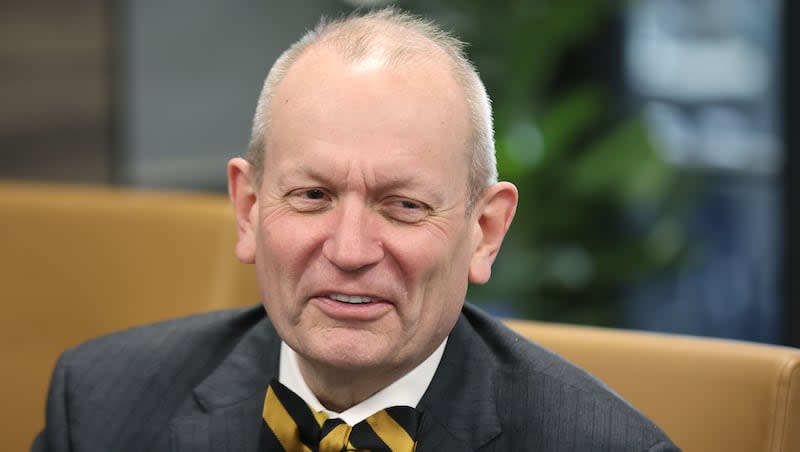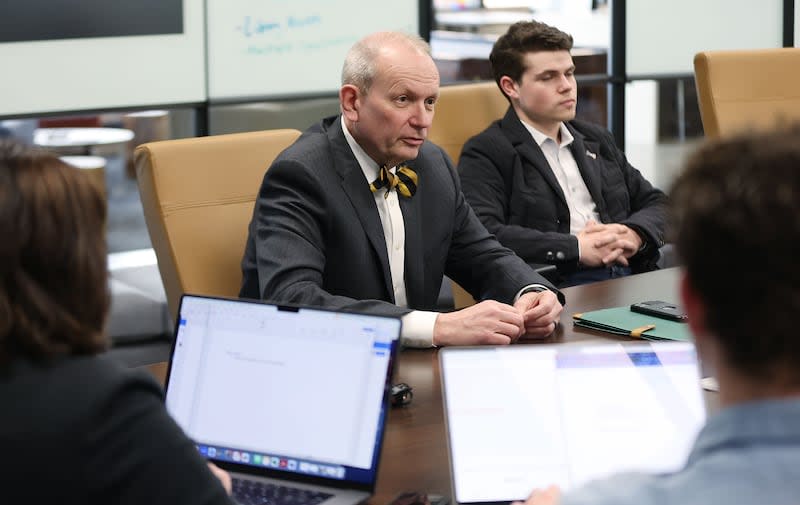Brent Hatch is following in his dad’s footsteps. Are Utah voters interested?

- Oops!Something went wrong.Please try again later.
Brent Hatch launched his U.S. Senate bid clear-eyed about what he saw as the nation’s biggest problem: debt and deficit spending.
But three months into the race, Hatch’s concerns now include the difficulty of campaigning as a political newcomer for the seat his father held for over four decades.
The “daunting” task of competing with other well-resourced Republican opponents to gather 28,000 signatures, paired with the challenge of swaying delegates in a polarized political environment, has left his primary ballot qualification “up in the air,” Hatch said.
“The daily grind of this is really pretty amazing,” Hatch told the Deseret News during an extended interview on Monday. “My father wasn’t here to warn me about that.”
Hatch is the son of the late Orrin Hatch, who was Utah’s longest serving U.S. Senator, holding the seat from 1977 to 2019. Not wanting to ride the coattails of his father, Hatch built a career outside of electoral politics, first working as a legal counsel in the Ronald Reagan and George H.W. Bush administrations and then as a litigator at his high-profile Salt Lake City firm.
But he said he shares his father’s desire to rein in federal spending and his disposition to cross the aisle to secure long-lasting policy accomplishments.
“You’re going to get a lot further with people, even if you disagree tremendously, if you treat them the way you want to be treated,” Hatch said. “And I think my father did that.”
What does Brent Hatch want to do about debt?
The way Hatch sees it, reforms to federal spending won’t be made by partisan performers. Real change requires individuals with conservative credentials to have the courage to sit down with the other side.
Politicians living “for the moment” is what placed the country on its current fiscal trajectory, with national debt increasing by $1 trillion every 100 days, Hatch said.
It’s unsustainable, he continued, for the government to be paying more in interest on its debt in a year, at $870 billion, than it spends on defense, at $822 billion, as it is projected to do in 2024.
“For me, this is the most troubling issue,” Hatch said.

Members of Congress need to view annual spending decisions as an “emergency proceeding,” striking out unnecessary pet projects and quickly moving to return the budget to pre-pandemic levels, Hatch said.
Then, if lawmakers are unwilling to “raise taxes or cut entitlements,” Hatch said they should work to decrease government regulations to increase productivity and tax revenue.
But an emphasis on fiscal restraint and civility might not be the winning combination with voters that it was for Hatch’s father in decades past.
How is Hatch doing with delegates?
At a recent candidate meet-and-greet, an attendee called Hatch a “liberal,” Hatch said. “I got right in his face, and I said, ‘Take it back. You don’t know me. What’s your basis for that? I’ve never been called that in my life.’”
Hatch was one of the early members of the Federalist Society and helped to vet conservative Supreme Court justices like Sandra Day O’Connor and Antonin Scalia, he said. He continues to serve on the conservative organization’s board of directors.
In March, Hatch scored the $2 million endorsement of a PAC funded by Club for Growth, which supports “limited-government, pro-growth economic conservative candidates.”
Hatch told the Deseret News the first step to address the nation’s border security crisis is to return to Trump-era executive actions, raising the threshold for asylum claims and requiring asylum seekers to await their court dates on the Mexico side of the border.
He also said the U.S. should demand European countries do more to support Ukraine in its war against Russia before providing more financial or military aid.
Hatch came in fifth place in a straw poll conducted last month among Washington County delegates. A greater number of delegates preferred political adviser Carolyn Phippen (13%), 3rd District congressman John Curtis (20%), former state House Speaker Brad Wilson (23%) and Riverton Mayor Trent Staggs who won the poll with nearly 32% of the vote.
Staggs has taken great lengths to frame himself as the candidate most aligned with former President Donald Trump, receiving endorsements from figures like Rep. Matt Gaetz, R-Fla., Sen. Tommy Tuberville, R-Ala., and Kari Lake.
Phippen, who, like Staggs, has placed her primary hopes entirely in the party convention system, has also sought to distinguish herself with strong views on immigration law enforcement and eliminating federal agencies.
But Hatch said Trump-rally rhetoric doesn’t always translate to substantive action on the Hill.
“We have people in this race who claim to be conservative, they’re not really, they’re just screamers,” Hatch said. “And they’re not going to get things done if they go back there.”
Will Hatch be able to gather enough signatures?
Hatch is also trailing among those who have invested the significant amount of money needed to gather tens of thousands of signatures that don’t overlap with other candidates’.
As of Monday evening, Wilson, Curtis and Moxie Pest Control CEO Jason Walton had submitted their first tranche of 28,000 signatures to the Utah Lieutenant Governor’s Office.
The Hatch campaign initially gathered signatures through volunteers, with Hatch going out to gather some personally. But he soon realized they would need to hire a professional signature-gathering firm, as other campaigns had done, to meet the April 13 deadline.
“I think that’s up in the air for sure,” Hatch said. “We’re on track, but there’s no telling what the state will do, how harsh they’re being on verifying signatures.”
Hatch said after getting a “master class in politics” from his father’s time in office, the one thing that has surprised him about campaigning is the “grueling schedule” that he said he had “probably underestimated.”
Hatch never had any serious discussions with his father about someday running for his Senate seat, he said, adding that counsel from his father would have been very appreciated.
“I really wish he were here,” Hatch said. “It would have been pretty nice to have had him as a senior adviser to the campaign.”
Asked whether if elected he would serve as many terms as his dad, Hatch joked that would make him nearly 110-years-old when he retired and said he would likely not serve a second term and definitely not a third term.
The Republican state convention will be held on April 27. Candidates who receive more than 40% of delegate votes, or who have gathered enough verified signatures, will appear on the primary ballot on June 25.
The GOP nominee who emerges from the primary will face off against the nominees from other registered political parties in the Nov. 5 general election.
Other Republican candidates, besides those already named, include Josh Randall, Brian Jenkins, Jeremy Friedbaum, Chandler Tanner and Clark S. White.
The Democratic candidates for U.S. Senate in Utah include mountaineer Caroline Gleich, Archie Williams III and Laird Hamblin.

